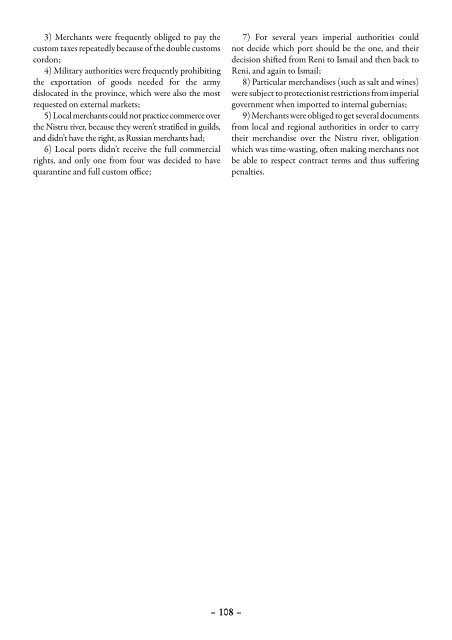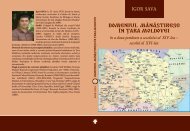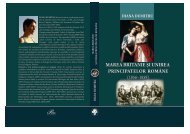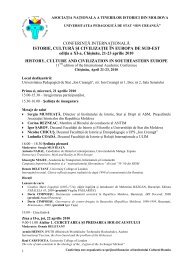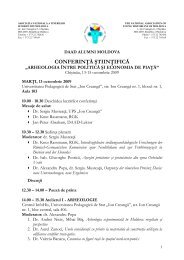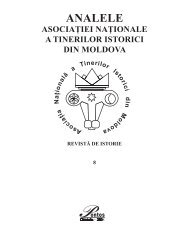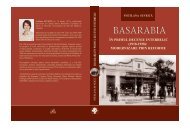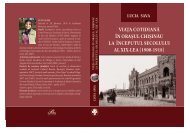- Page 2 and 3:
TRATATUL DE PACE DE LA BUCUREŞTI D
- Page 4 and 5:
TRATATUL DE PACE DE LA BUCUREŞTI D
- Page 6 and 7:
CUPRINS Introducere................
- Page 8 and 9:
INTRODUCERE În anul 2012, în Euro
- Page 10 and 11:
MUTAŢII ÎN SISTEMUL POLITIC EUROP
- Page 12 and 13:
ţarul Alexandru I. La realizarea a
- Page 14 and 15:
precum şi cele ale Bourbonilor şi
- Page 16 and 17:
toamna anului 1818, a marcat sfâr
- Page 18 and 19:
from its continental allies, becaus
- Page 20 and 21:
REPERCUSIUNILE PREZENŢEI ARMATEI R
- Page 22 and 23:
cunoscută fiecărui om chiar şi
- Page 24 and 25:
iar acum aceleaşi armate trec prin
- Page 26 and 27:
Populaţia de la frontiera de apus
- Page 28 and 29:
61 (5,9%), Greceni - 50 (4,9%), Hot
- Page 30 and 31:
Mai frecvente, decât în prima per
- Page 32 and 33:
periods: 1812-1818 and 1819-1828, c
- Page 34 and 35:
Tabelul 2 Plângerile ţăranilor
- Page 36 and 37:
Tabelul 4 Plângerile ţăranilor
- Page 38 and 39:
МОЛДОВА, ГОД 1812: ПОП
- Page 40 and 41:
фицировать как жал
- Page 42 and 43:
кэуского цинута на
- Page 44 and 45:
ПОЛОЖЕНИЕ РУМЫНСКИ
- Page 46 and 47:
нокомандующему рус
- Page 48 and 49:
в Горжинском уезде
- Page 50 and 51:
Принимая во вниман
- Page 52 and 53:
SUMMARY POSITION OF THE ROMANIAN PR
- Page 54 and 55:
ANUL 1812 SUB IMPACTUL FACTORULUI F
- Page 56 and 57:
piedica principală în calea ader
- Page 58 and 59: evoluția medicinii și de aplicare
- Page 60 and 61: Cert se prezintă că, în timp ce
- Page 62 and 63: La 30 ianuarie (11 februarie) 1811
- Page 64 and 65: că hotarul pe râul Siret era inac
- Page 66 and 67: uzi, soartă care, de obicei, este
- Page 68 and 69: ASPECTE ALE CIRCULAŢIEI MONETARE
- Page 70 and 71: Petersburg”, şi în Principate a
- Page 72 and 73: ASPECTE ISTORIOGRAFICE CONTROVERSAT
- Page 74 and 75: din Basarabia, trece în revistă p
- Page 76 and 77: alungarea bandei lui Manaf Ibrahim,
- Page 78 and 79: a lui Bairactar-Paşa 78 . În albi
- Page 80 and 81: care a unui centru urban nou în su
- Page 82 and 83: SUMMARY CONTROVERSIAL HISTORIOGRAPH
- Page 84 and 85: REGULAMENTUL PRIVIND ORGANIZAREA RE
- Page 86 and 87: Printre primele instituţii care au
- Page 88 and 89: tului din 1818 de a adopta deciziil
- Page 90 and 91: că „nimeni dintre ei nu poseda l
- Page 92 and 93: Rezidentul plenipotenţiar i-a numi
- Page 94 and 95: cu privire la carantină, aprobat d
- Page 96 and 97: intermediul limbii ruse” 114 . Im
- Page 98 and 99: IZOLAREA COMERCIAL-VAMALĂ A BASARA
- Page 100 and 101: se întreprindă toate măsurile de
- Page 102 and 103: asemenea, prin ordinul ministrului
- Page 104 and 105: probată de funcţionarii vamali di
- Page 106 and 107: pe care le întâmpina la exportul
- Page 110 and 111: СOLONIZĂRILE BULGARILOR ÎN BASAR
- Page 112 and 113: statistice din această perioadă n
- Page 114 and 115: Ion Balş, Panaiot Kazimir, Grigori
- Page 116 and 117: comisia condusă de Iuşnevschi şi
- Page 118 and 119: pentru drepturile lor şi cu ajutor
- Page 120 and 121: ZUSAMENFASSUNG DIE KOLONISIERUNG DE
- Page 122 and 123: PROBLEMA BASARABIEI DE SUD ÎN DISC
- Page 124 and 125: oadelor culturii europene, ultima l
- Page 126 and 127: comparaţie cu modelele imperiale e
- Page 128 and 129: oficiale către ministrul de intern
- Page 130 and 131: CONGRESUL DE PACE DE LA BERLIN, IND
- Page 132 and 133: ilor garante ale Tratatului de la P
- Page 134 and 135: nale au fost încălcate de acesta.
- Page 136 and 137: au acceptat retragerea armatelor ru
- Page 138 and 139: cu convingerea că forumul european
- Page 140 and 141: Kogălniceanu, că nu ar fi apărat
- Page 142 and 143: ECOURI ÎN ROMÂNIA ALE CENTENARULU
- Page 144 and 145: Se evidenția, de asemenea, nevoia
- Page 146 and 147: iilor absolute și semiasiatice ca
- Page 148 and 149: ISTORIE ŞI DIPLOMAŢIE LA 1912. 10
- Page 150 and 151: său Raymond Poincaré, considera a
- Page 152 and 153: ţarist la Chişinău Pentru o soci
- Page 154 and 155: acţiunea de la Biserica Antim, ini
- Page 156 and 157: SUMMARY HISTORY AND DIPLOMACY IN 19
- Page 158 and 159:
DESTINUL BASARABIEI REFLECTAT ÎN L
- Page 160 and 161:
Exceptând intervenţiile lui Const
- Page 162 and 163:
Verussi” 46 . Era un gând păstr
- Page 164 and 165:
Serafim Ciceagov, „ziua aniversă
- Page 166 and 167:
vedere cu temniţa politică din Ch
- Page 168 and 169:
fost aranjate cu hărţi, stampe, d
- Page 170 and 171:
interesului nostru faţă de Basara
- Page 172 and 173:
presa timpului despre EVENIMENTUL D
- Page 174 and 175:
S-au strâns, credem, vreo 10-15 00
- Page 176 and 177:
Ceea ce trebuie de subliniat, în
- Page 178 and 179:
ANEXAREA BASARABIEI: MENTALITATE Ş
- Page 180 and 181:
primul rând, populaţia Basarabiei
- Page 182 and 183:
mântului: „Cea de-a patra naţio
- Page 184 and 185:
excelenţă modern şi a marcat, î
- Page 186 and 187:
de cele de ordin economic şi socia
- Page 188 and 189:
sunt mai mult negative, împrumutat
- Page 190 and 191:
ANUL 1812 ŞI ÎNTRERUPEREA PROCESU
- Page 192 and 193:
şcoliţi la colegiile iezuite din
- Page 194 and 195:
abeni, formaţi în perioada interb
- Page 196 and 197:
CANCELARIILE EUROPENE DIN PRIMA JUM
- Page 198 and 199:
că românii din Moldova, Ţara Rom
- Page 200 and 201:
În grupul acestora înglobează ş
- Page 202 and 203:
Aceste constatări ne determină s
- Page 204 and 205:
BASARABIA, CONTEXTUL IMPERIAL ŞI D
- Page 206 and 207:
1814, care impunea restricţii deos
- Page 208 and 209:
În şedinţa din 28 februarie 1816
- Page 210 and 211:
Macavei carte” 59 din cuprinsul B
- Page 212 and 213:
editorială (1812-1821) a Societă
- Page 214 and 215:
ierarhică/socială era respectată
- Page 216 and 217:
SUMMARY BESSARABIA, THE IMPERIAL CO
- Page 218 and 219:
BISERICA ORTODOXĂ DIN BASARABIA SU
- Page 220 and 221:
Svetlana Prozorovchi 32 . Despre ar
- Page 222 and 223:
ici în Chişinău (Sf. Treime, Sf.
- Page 224 and 225:
căzuţi pe front, proiect care nu
- Page 226 and 227:
Bogos, Alexandru Baltaga, Vladimir
- Page 228 and 229:
conducere: egumeni, locţiitori de
- Page 230 and 231:
produceau, cea mai mare parte a pre
- Page 232 and 233:
CONSECINŢELE RAPTULUI TERITORIAL D
- Page 234 and 235:
- una spirituală pentru băieţi (
- Page 236 and 237:
ai acestei organizaţii. Devine sus
- Page 238 and 239:
BISERICA ORTODOXĂ - INSTRUMENT DE
- Page 240 and 241:
ţiei bisericeşti. După asasinare
- Page 242 and 243:
ţele rusificării a fost înstrăi
- Page 244 and 245:
ANEXA 1 Obiectele şi numărul de o
- Page 246 and 247:
BASARABIA ÎN CONTEXTUL RELAŢIILOR
- Page 248 and 249:
în baza certificatelor comerciale
- Page 250 and 251:
vamale din Reni şi Sculeni, iar di
- Page 252 and 253:
NOBILIMEA BASARABEANĂ, EVENIMENTEL
- Page 254 and 255:
a primit vestea despre naşterea vi
- Page 256 and 257:
Împărate! Actualul amestec al str
- Page 258 and 259:
ROLUL NOBILIMII ÎN VIAŢA PUBLICĂ
- Page 260 and 261:
şi „Bessarabeţ”, editate de P
- Page 262 and 263:
MIŞCAREA NAŢIONALĂ DIN BASARABIA
- Page 264 and 265:
Membrii societăţii „Milcov” d
- Page 266 and 267:
Господину Директор
- Page 268 and 269:
№ 9 Выписка из пись
- Page 270 and 271:
№ 13 Совершенно сек
- Page 272 and 273:
чески, в отношении
- Page 274 and 275:
CONTRIBUŢII LA ISTORIA ÎNVĂŢĂM
- Page 276 and 277:
semnificativ, întrucât numărul c
- Page 278 and 279:
şi prezenţa armatelor pe aceste t
- Page 280 and 281:
disciplinelor în limba rusă, înl
- Page 282 and 283:
itatea Ministerului Învăţământ
- Page 284 and 285:
1873, a şcolii reale din Chişină
- Page 286 and 287:
gîndirea pedagogică, Editura Şti
- Page 288 and 289:
EVACUAREA EVREILOR DIN TÂRGUL FLOR
- Page 290 and 291:
se permite deschiderea unui iarmaro
- Page 292 and 293:
3) aşezarea posedă o conducere ap
- Page 294 and 295:
was the location a fair or a villag
- Page 296 and 297:
IMPACTUL RELAŢIILOR SOVIETO-ROMÂN
- Page 298 and 299:
maţi despre atmosfera care a domin
- Page 300 and 301:
educaţiei marxist-leniniste au fos
- Page 302 and 303:
espective, atunci în politica „c
- Page 304 and 305:
ANUL 1812 ÎN DISCURSUL PUBLIC AL M
- Page 306 and 307:
vorbea despre faptul că în 1812 M
- Page 308 and 309:
Naţionale, din 16 decembrie 1990,
- Page 310 and 311:
separatiste de la Comrat şi Tirasp
- Page 312 and 313:
ANUL 1812 ŞI PIERDEREA BASARABIEI:
- Page 314 and 315:
· anexarea Basarabiei a fost, în
- Page 316 and 317:
anumitor imagini ale trecutului col
- Page 318 and 319:
în versuri, scrise în diverse tim
- Page 320 and 321:
APARIŢIA CHESTIUNII BASARABIEI ÎN
- Page 322 and 323:
parte știa foarte bine că dacă a
- Page 324 and 325:
a silit pe turci de a nu se folosi
- Page 326 and 327:
Convenția de la Erfurt era caducă
- Page 328 and 329:
supus spre vot Congresului, se con
- Page 330 and 331:
the dividing of areas of influence
- Page 332 and 333:
ANUL 1812 ÎN MANUALELE ȘCOLARE DI
- Page 334 and 335:
Prut și Nistru, căreia i-au dat n
- Page 336 and 337:
2008 40 . Aceste schimbări au cons
- Page 338 and 339:
În acest manual, informațiile des
- Page 340 and 341:
DOUĂ SUTE DE ANI DE OCUPAŢIE RUSE
- Page 342 and 343:
sprijinul aliaţilor şi al guvernu
- Page 344 and 345:
În cadrul politicii lingvistice, a
- Page 346 and 347:
în acest demers este faptul că ac
- Page 348 and 349:
RECENZIE Ion Agrigoroaiei, Basarabi
- Page 350 and 351:
Ucraineană. Este cuprins astfel ca
- Page 352 and 353:
14.00-15.30 Sesiunea 2: Anul 1812


